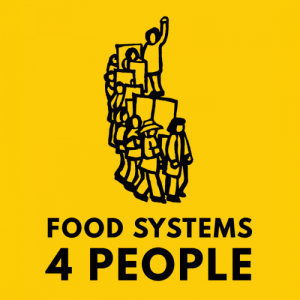A Change of Course on Food Systems Now, to Save the Right to Food and the Planet
The support of Italian organizations committed to the right to food for social movements and Indigenous Peoples opposing the new United Nations Summit on Food Systems (UNFSS+2) opening on Monday, July 24th in Rome.

Rome, July 21, 2023 – On the eve of the new United Nations Summit on Food Systems, which will begin on Monday, July 24th, at the FAO – UNFSS+2 Stocktaking Moment, the global movement for food justice, small producers’ organizations, and Indigenous Peoples, representing millions of people worldwide, denounce in their statement how this summit has been designed to overlook the need for profound structural transformations in our food systems, instead emphasizing a model that prioritizes profit over the public interest.
The main concern of the representatives who have expressed strong criticism of the Summit remains the growing influence of multinational corporations and their intermediaries within the United Nations, where the new multistakeholder approach has opened the doors to large industrial groups and global distribution chains, risking the control of food systems by multinational corporations.
In a press conference held on July 17th, representatives of the Autonomous Response of People to the UN Summit on Food Systems highlighted the urgent and coordinated actions needed to overcome global food crises, respect rights, and respond to the demands of those most affected by hunger and climate and health crises. The world needs food systems capable of promoting biodiversity, agroecology to feed the planet, and a food production strategy based on short supply chains and agricultural communities, which are the only ones capable of prioritizing nature and the public interest over purely commercial objectives of large chemical and food corporations. “The rights of people to access and control land and productive resources must be guaranteed, and agroecological production models and farmer seeds must be promoted,” said Ibrahima Coulibaly, President of the Network of Farmers’ and Agricultural Producers’ Organizations of West Africa (ROPPA).
“The United Nations Summit on food systems not only ignored our rights and the structural causes of the crises,” says Saúl Vicente of the International Indian Treaty Council, “but it intends to favor corporate and industrial interests over the transformation of food systems.” A true change in food systems is possible and necessary for people and the planet, especially as it is now clear that with current strategies, the goal of ending hunger by 2030 cannot be achieved. The ongoing systemic crisis is the product of failed policies that have increased dependencies and, consequently, inequalities, severely compromising and continuing to compromise the environment and biodiversity, leading to repercussions that worsen global debt and climate crises.
“In the last two decades, communities worldwide have developed concrete and effective strategies to address climate and food crises while respecting cultural diversity, social justice, and human and collective rights. These strategies include food sovereignty, agroecology, biodiversity revitalization, territorial markets, and the social and solidarity economy,” says Shalmali Guttal of Focus on the Global South. “The evidence is overwhelming: the solutions of small food producers and Indigenous Peoples not only feed the world but also promote economic, social, and gender justice, youth empowerment, workers’ rights, and true resilience in the face of crises. Why don’t policymakers listen to them and provide them with the right support?”
The newly published report by the Food First Information and Action Network – FIAN, “Transformation of Food Systems – In Which Direction?” urgently calls for a deep and radical revision of the global architecture of food governance to ensure a decision-making process that prioritizes the public good and the human right to food. “The communities on the front lines of facing the food crisis,” says Raj Patel of IPES-Food, “are paradoxically used by multinational corporations as an excuse to increase their profits. It is a real tragedy that the policymakers at the top of the global food system ignore the proposals of social movements on how to end hunger, which are much more effective because they are based on the diverse realities of territories.” “As hunger increases worldwide, and the crisis worsens, it is more urgent than ever for governments and the United Nations to listen to us,” says Perla Álvarez of La Vía Campesina. “We appeal to you: change course and support our demands and efforts for a future of food sovereignty based on human rights and agroecological principles, care, justice, diversity, solidarity, and responsibility.”
The organizations endorsing this statement, while expressing their support for social movements and Indigenous Peoples opposing UNFSS+2, reaffirm their commitment to food justice and sovereignty and reiterate their full readiness to work in all local, national, and international networks in support of peasant agriculture, agroecology, biodiversity protection, climate and economic justice, and solidary and responsible food systems.
First signatories:
AOI – Associanzione ONG Italiane (Association of Italian NGOs)
Associazione Botteghe del Mondo (World Shops Association)
Cooperativa agricola Co.r.ag.gio (Agricultural Cooperative Co.r.ag.gio)
Fairwatch
GCAP Italia (Global Call for Action against Poverty) Coalizione italiana contro la povertà (Italian Coalition against Poverty)
FOCSVIV – Volontari nel Mondo (Volunteers in the World)
Link 2007
LVIA – Associazione Internazionale Volontari Laici (International Association of Lay Volunteers)
Reorient
SID – Society for International Development
Slow Food Italia
Slow Food Roma
Terra Nuova
